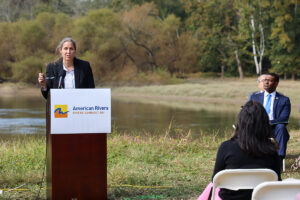News
After Groups’ Legal Action, Duke Energy Releases Critical Dam Safety Information
Posted on October 12th, 2017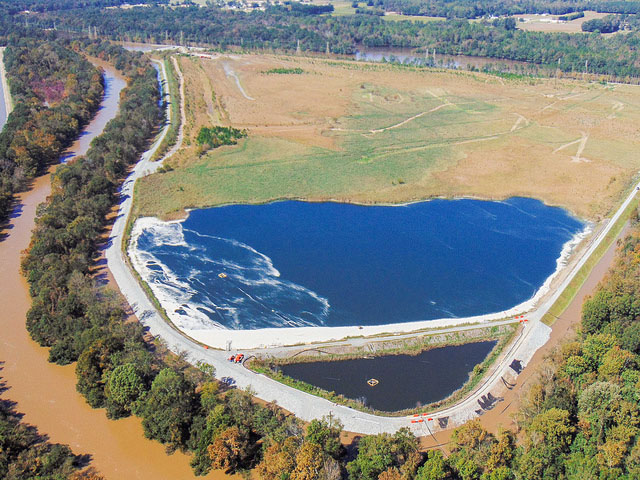
HF Lee Coal Ash Pond Post-Hurricane Matthew
Press Release from the Southern Environmental Law Center
For Immediate Release: October 9, 2017
Contact:
Kathleen Sullivan, 919-945-7106 or ksullivan@selcnc.org
After Groups’ Legal Action, Duke Energy Releases Critical Dam Safety Information for Coal Ash Sites across North Carolina
CHAPEL HILL, N.C.— More than two weeks after local community groups notified Duke Energy that they planned to bring enforcement actions against it for withholding legally-required critical dam safety information for coal ash sites across North Carolina, Duke Energy finally posted the information. A spill from Duke Energy’s leaking coal ash lagoons would flood the drinking water intake for the city of Madison on the Dan River, and scores of homes, businesses, and highways throughout North Carolina with coal ash containing toxic metals and other pollutants, according to Duke Energy reports that were previously censored by the company in violation of federal law. Examples of what Duke Energy’s information shows for its Marshall and Belews Creek sites can be seen here: https://southernenvironment.sharefile.com/d-sd7ec0e9efef41f29
The Southern Environmental Law Center sent notices on behalf of community organizations regarding 10 Duke Energy sites across North Carolina where primitive, aging earthen dams hold back coal ash next to rivers and lakes. Behind dams rated High and Significant Potential Hazards, these unlined, leaking Duke Energy sites hold a total of over 92 million tons of coal ash upstream of public drinking water intakes and many are located near people’s homes and communities.
The Southern Environmental Law Center sent 10 notices on behalf of these community groups in North Carolina: Appalachian Voices, Catawba Riverkeeper Foundation, MountainTrue, Roanoke River Basin Association, Sound Rivers, Southern Alliance for Clean Energy, Waterkeeper Alliance, and Winyah Rivers Foundation. Earthjustice sent four similar notices on behalf of community organizations in Kentucky and Indiana.
Under the Coal Combustion Residuals Rule enacted in 2015 following coal ash disasters, including at Duke Energy’s Dan River site in North Carolina, Duke Energy was required to make public Emergency Action Plans for each of its coal ash storage sites where a failure would likely result in loss of human life or serious harm to the environment by April 27, 2017. Those plans are required to include inundation maps to show the surrounding areas that would be damaged by a failure of Duke Energy’s dangerous coal ash storage sites and also the names and contact information for emergency responders. This information is designed to let communities know the risks they face and also how to respond when a coal ash disaster occurs. Duke Energy published Emergency Action Plans on its legally-required website on April 29, but blacked out the maps, the emergency responders, and electronic links to the maps.
Duke Energy was the only utility in the country withholding this information from the public. In all of Duke Energy’s Emergency Action Plans, including in states that face flooding and hurricanes, Duke Energy had blacked out the coal ash spill maps and information for how to contact emergency responders in the event of a disaster. An example of Duke Energy’s blacked-out emergency plans can be seen at this link: https://southernenvironment.sharefile.com/d-sf596f36bc3f4e1a8
The September 20, 2017, notices challenged Duke Energy’s withholding of information regarding the following Duke Energy coal ash storage sites in North Carolina: Allen on Lake Wylie near Belmont and Charlotte, Asheville on the French Broad River near Asheville, Belews Creek on the Dan River in Stokes County near Eden and Madison, Cliffside (Rogers Energy) on the Broad River near Shelby, Dan River on the Dan River near Danville, Lee on the Neuse River near Goldsboro, Marshall on Lake Norman near Mooresville and Charlotte, Mayo on Mayo Lake and the Dan River near Roxboro, Roxboro on Hyco Lake and the Dan River near Roxboro, and Weatherspoon on the Lumber River in Robeson County near Lumberton. These notices are available here: https://southernenvironment.sharefile.com/d-sa4092ae06794d3bb
“Now we know what Duke Energy was trying to hide,” said Frank Holleman, senior attorney at the Southern Environmental Law Center which represents the North Carolina groups. “Duke Energy’s dangerous coal ash lagoons threaten families, houses, property, lakes, and rivers throughout North Carolina if they fail. A wall of coal ash and polluted water could pour out of lagoons into neighborhoods and water supplies, flooding houses, businesses, roads, and highways. Duke Energy should not impose these risks upon families and clean water. Duke Energy needs to move all its coal ash to safe, dry, lined storage where it will not pollute and cannot harm North Carolina’s families and drinking water.”
Duke Energy’s operating companies are on nationwide federal criminal probation because in 2015 they pleaded guilty 18 times to nine Clean Water Act crimes committed at its coal ash sites across North Carolina. Duke Energy was responsible for one of the largest coal ash disasters in U.S. history when its Dan River coal ash site failed in 2014, spilling over 20 million gallons of coal ash polluted water and 39,000 tons of coal ash into the Dan River. Duke Energy is facing continuing litigation at six of its coal ash sites in North Carolina where it continues to refuse to remove its coal ash from leaking and polluting unlined pits on the banks of rivers and lakes in North Carolina. By criminal plea agreement, court order, settlement agreement, and regulatory requirements, Duke Energy is required to remove all its coal ash from 10 of its sites in North and South Carolina.
Additional comments from the community groups in North Carolina follow.
Sam Perkins, Catawba Riverkeeper at the Catawba Riverkeeper Foundation, client on the Allen and Marshall notices:
“People who depend on drinking water from near or downstream of Duke Energy’s unlined, leaking coal ash pits at Marshall and Allen, including people who live around Lake Norman and in Charlotte and on Lake Wylie in Belmont and York County, South Carolina, need to know what the risks are and emergency information to prepare in case there is another Duke Energy coal ash disaster. These lagoons loom high over lakes with densely populated waterfront development and on-water recreation that generate significant property and sales tax revenues.”
Hartwell Carson, French Broad Riverkeeper at MountainTrue, client on the Asheville and Cliffside (Rogers Energy) notices:
“We’re glad that Duke Energy is responding to our complaint in a reasonable manner. Making this safety information available to the communities who live around these coal ash sites is the right thing to do. The people who live downstream from these dams deserve to know the risks and what the company’s response will be in the case of another coal ash disaster.”
Matthew Starr, the Upper Neuse Riverkeeper at Sound Rivers, client on the Lee notice:
“During Hurricane Matthew, Duke Energy’s safeguards failed and toxic coal ash was dumped into the Neuse River and cooling pond dam broke open. Instead of responding to this mistake with transparency, Duke decided in the months following the spill to hide vital information from the public. Yet again, this company has shown it’s only willing to do the right thing when an arm is twisted and they’ve been taken to task by the people and organizations working to protect our water and community health.”
Scott Van Der Hyde, executive director at the Roanoke River Basin Association, client on the Dan River, Mayo and Roxboro notices:
“For people living in the Dan River and Roanoke River watershed, a disastrous coal ash spill is not an abstract possibility–we have experienced such a spill firsthand. We are pleased to see that responsible action is finally being taken to make these emergency action plans public so our communities can plan for the danger posed by these coal ash storage facilities. The long-term solution is to remove the threat by eliminating these leaking lagoons.”
Amelia Shenstone of the Southern Alliance for Clean Energy, client on the Dan River notice:
“As we know from Duke’s Dan River coal ash disaster, it’s critical for downstream communities and responders to have this risk and emergency information when a coal ash disaster strikes.”
Pete Harrison of Waterkeeper Alliance, client on the Allen, Asheville, Dan River, Lee, and Marshall notices:
“You’d think that after being convicted on nine counts of federal coal ash crimes and having to pay over a hundred million dollars in fines and restitution, Duke Energy would have learned it doesn’t get to pick and choose which laws it has to obey and which ones it can ignore. Illegally concealing vital safety information from people who live in the shadows of its massive, leaking coal ash dumps is a new low for this habitual offender – especially when you consider every other power company in the country complied with these basic safety requirements.”
Christine Ellis of the Winyah Rivers Foundation, client on the Weatherspoon notice:
“Better informed is better prepared and Duke needs to know that we care about the impacts of coal ash on the adjacent community and the potential for inundation should the ash basin fail before the coal ash is eventually excavated and removed from the site.”
###
Note: Duke Energy’s Emergency Action Plans for their coal ash sites can be found through this webpage https://www.duke-energy.com/our-company/environment/compliance-and-reporting/ccr-rule-compliance-data by selecting the site and then the link to the respective Emergency Action Plan.
About the Southern Environmental Law Center
The Southern Environmental Law Center is celebrating its 30th anniversary this year. With nine offices across the region (Charlottesville, VA; Chapel Hill, NC; Atlanta, GA; Charleston, SC; Washington, DC; Birmingham, AL; Nashville, TN; Asheville, NC; and Richmond, VA), SELC is widely recognized as the Southeast’s foremost environmental organization and regional leader. SELC works on a full range of environmental issues to protect the South’s natural resources and the health and well-being of all the people in our region. www.SouthernEnvironment.org
Related News

Welcome 2025!
January 2nd 2025

Welcoming the new year with a recap of 2024!
December 27th 2024
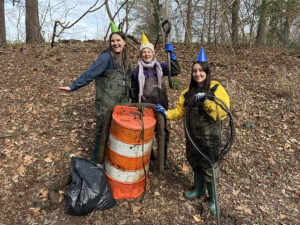
Trash traps get holiday cleanouts!
December 19th 2024
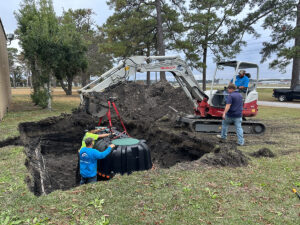
Underground cistern a first for Sound Rivers
December 19th 2024
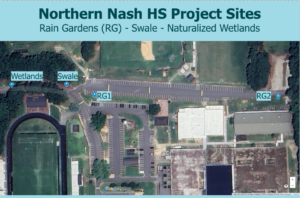
Campus Stormwater takes on Northern Nash
December 19th 2024

It's the holidays (and we like gifts too!)
December 19th 2024
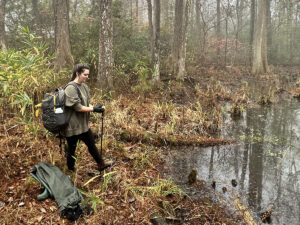
Riverkeeper, specialist seek answers in Slocum swamp
December 19th 2024

Progress on Smithfield pollution problem
December 19th 2024
